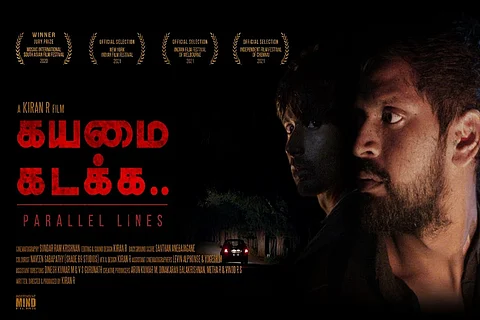

In Kayamai Kadakka, debut director R Kiran delivers in terms of style, storytelling, and pacing, giving us a solid film. The thriller relies on a muted intensity that is compelling and intimate. He has a deftness as a filmmaker that makes one keep forgetting that this is his first feature film. With hardly any other characters present, the lead actors Masanth Natarajan and Vatsan M Natarajan almost impeccably hold our interest for the entire run of the film. The two really get into the skins of the characters they play.
It’s the film’s politics that is a let-down. Two young men lead the story, both named Santhosh. One (Vatsan M Natarajan) on a “mission”, another (Masanth Natarajan) who posts violent, self-righteous messages about rapists on his Facebook . They strike up a friendship online over their shared notion of “justice”—that rapists should be killed; “their cries be heard in every dark corner of streets”—which they misguidedly believe is the way to stop sexual assault. Santhosh who-posts-on-Facebook is mild-mannered in person, seemingly unsure of himself. His beliefs are called to test when he meets his namesake in person. Vatsan’s Santhosh is a man utterly convinced he is on the right path except when his alter-ego Karthik, for lack of a better word, appears. His “path” is to deliver what he believes is justice. That is, he murders acquitted rapists. He has a “list” and he’s on “a mission” which he intends to turn into a “movement”.
Masanth’s Santhosh is initially horrified, confused and unable to accept someone putting into action the very things he posts about on social media. His conflict and internal chaos contrast with the absolute assuredness of the other Santhosh. The withering down of this conflict, even as the stronger-willed Santhosh with increasing intensity tries to dispel his friend’s distress, comes through with convincing clarity. Yet, Masanth’s Santhosh’s transition isn’t that smooth. Meanwhile, Vatsan's Santhosh, with the personality disorder, has an alter ego, Karthik, who thinks his views are wrong as well. Each time Karthik surfaces, the duality of both Santhoshes is upended.
Perhaps as a plot device, the inclusion of “multiple personality disorder” serves to disrupt the tempo at which the story is moving. But in terms of representing mental health, it is discomfiting. Dialogues such as “haven’t you watched Anniyan?” from a character who appears to be a mental health professional to describe Santhosh’s problem, gravely mischaracterises those who struggle with the complexities of personality disorders.
At one point Santhosh, the one on his murderous mission, says that he doesn’t want his four-year-old daughter to grow up in a dangerous world. It’s his “duty”, he says to ensure that. “Isn’t that enough reason for me to be a killer?” Ideally, no.
If the film’s purpose had been to drag into the light our own darkest thoughts, our collective rage when incidents of sexual assault make it to the news (a paltry percentage of actual crimes rates), it would have shown a rare strength. It could have analysed our own furies, our macabre, misguided spurts of desire for vengeance. But Kayamai Kadakka doesn’t offer critique, doesn’t introspect or weigh visceral reactions alongside the long ongoing nuanced conversation about carceral systems, alternative justice and the death penalty. Instead, it makes the unfortunate choice of valourising vigilantism.
The flaws in our existing investigative and judicial mechanisms that fail to give convictions on time or lead to acquittals cannot be addressed by playing out revenge fantasies. Turning the social media baying for blood that tends to happen after every reported sexual assault into a film that enacts and justifies that violence is not about gender rights or “stopping rape”. It’s misogyny. Calls for extra judicial killings or celebrating them do not stem from concerns about sexual violence. These measures are often used to dodge oversight and accountability. In reality, those who are killed extra judicially are from vulnerable class and caste groups precisely because there is hardly anyone to answer to.
The central peg of most mainstream Tamil films, maybe exactly that—vigilante justice, but even those are finally being called out, such as the extra judicial killing of a rapist in Theri. As the habit of audiences whistling to heroes doing vigilantism on-screen is offered as justification in Kayamai Kadakka, I have to admit confusion: does this film want the same internal logic of hero-centric formula cinema to be applied to itself or does it want to be viewed as a somber, more realistic commentary on sexual violence?
Also in reality, when people, particularly women, have condemned such killings on social media, it has been largely cisgender heterosexual men who have resorted to online abuse. Sexual violence is the deliberate disregard for consent. Without taking this into account, with no victim or survivor present to speak for themselves, two men with a saviour complex deciding what “justice” should be in the case of sexual violence, left me feeling deeply uncomfortable.
Disclaimer: This review was not paid for or commissioned by anyone associated with the series/film. TNM Editorial is independent of any business relationship the organisation may have with producers or any other members of its cast or crew.